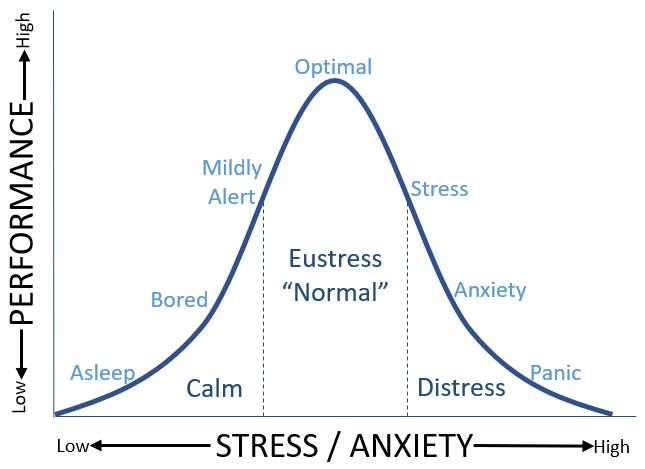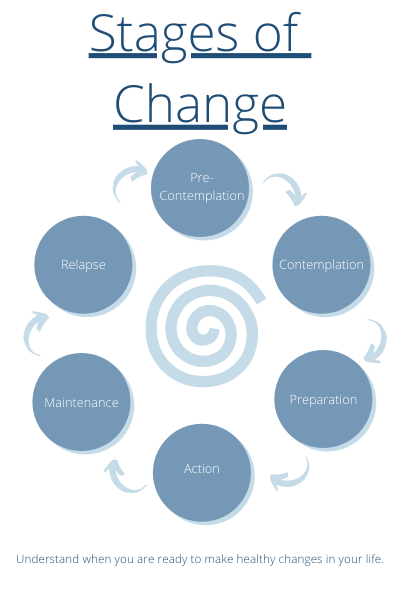How Stress can be Good for You

Stress is oftentimes viewed as bad. However, some level of stress can be good for you. Good stress can be a normal, healthy aspect of our lives. Healthy levels motivate us to perform well. It provides the energy needed to rise to a challenge. It can be incredibly helpful. However, the problem occurs when we experience too much stress or anxiety. It can be unhealthy when our body experiences high level for day-to-day events (i.e., traffic, financial worries, work, or relationship issues). When we experience too much, it can become debilitating and impair our functioning. Let’s discuss some more about the good and bad types of stress.
Low Stress
Think of anxiety on a bell-curve (do you remember bell-curves from high school?!). This specific bell-curve model is called the Yerkes-Dodson Law. Minimal stress means minimal performance, or productivity. Think of a beach bum who lives on the beach. He may have little stress in the world, but he also is not very productive in life. Such low levels are associated with either increased sleep or boredom.
If your stress level is too low and you find yourself bored, then you want to increase your productivity. Consider pushing yourself out of your comfort zone a little more. Challenge yourself to learn something new every day, no matter how small it may be. Set higher goals that are more challenging. Keep rising to a challenge!
High Stress
High levels of stress cause impairments in performance and functioning. It can be debilitating. We are not productive and we accomplish less because the stress is working against us. We are in distress and overwhelmed physically, mentally, and/or emotionally. Think of a time in which you experienced high levels of stress. Maybe you can recall spending extra time and energy trying to accomplish tasks, but you got less work done? Or maybe you can recall feeling so overwhelmed by your workload that you couldn’t focus to get anything done? Too much is debilitating and impairs our ability to perform well.
To understand more about how high levels of stress can impair your functioning, check out my list of common stress symptoms here.
Eustress
It is important to have a healthy balance of stress, not too low or high. The healthy version is called Eustress. Eustress is a healthy balance which allows us to rise to a challenge and be productive without impairing our functioning. Eustress allows us to feel motivated with focused energy and empowers us to accomplish tasks or goals. We want to feel challenged and productive, but not at the expense of our physical, mental, or emotional well-being. This is an ideal state of being because we believe the stress we experience in that moment is within our ability to handle.
The Compounding Effects of Stress
Although stress can be experienced through one specific stressor, most of the time it is a combination of multiple stressors going on. Let’s take a moment to imagine how it builds. Do you remember those old-school thermometers with the red mercury? Before you ever use it, there is some level of red mercury already in the bottom of the thermometer. I equate this to your biological level of stress that you were born with. Have you ever met a family that is laid back while others are more intense? It is likely due to a difference in biological levels that are present at their baseline state.
The red mercury in the thermometer rises as the temperature heats. I equate this to all the environmental stressors building up. For example, let’s say you are late to work, then you get hit with a major project at work, then you get in an argument with the spouse. All these stressors build and build. Sometimes it is then the littlest issue that can set you over the edge. For example, your toothpaste falls off your brush and then you explode! If we don’t find a way to bring our stress down to a calmer state, then we may hit our breaking point.
Coping with Stress
Unhealthy ways of handling stress can be broken down into two categories – implosion or explosion. Both occur when we hit our maximum threshold. Explosions occur when we show our stress outwardly. Examples of explosion could be yelling, snapping, or hitting. Implosions occur when we turn our stress inward. Examples of implosions could be hating yourself, internal angst, or suicidal ideations or behaviors at the more severe levels.
It is important to establish healthy coping skills to decrease stress, prevent yourself from hitting the implosion/explosion point, and maintain a calm mood. When you are in a calmer state, you can more efficiently solve problems.
If you notice yourself experience these symptoms, then it is time to implement more self-care activities in your life. (It’s in this moment that you may be thinking – I’m too stressed to add something else to my day!!!). The idea is that if we can take a few minutes to engage in self-care and calm down, then we can actually be more productive. For example, if our stress is too high and impairing our ability to concentrate, then taking a 5-10 walk break will help calm down our internal system so that we can return to our tasks with improved concentration and better productivity. There are so many self-care activities that can take less than 5 minutes of your day. Check out my list of 50 self-care activities here.
Challenge
Your challenge for this week is to evaluate your own stress level. Think about your professional and personal stressors. Are you bored and need to set some additional goals for yourself? Or is it so high that it is causes impairments? Or maybe your stress level is just right – challenging but not overwhelming.
If your stress level is too low, I encourage you to think through how you can step outside your comfort zone and challenge yourself. If your stress level is too high, identify the specific stressors in your life that may be overwhelming. Break it down to the specifics. Don’t just say “work” as your stressor, but identify what specifically at work is stressful. Is it a certain work task or a certain person at your workplace? Once you have identified the stressor, understand how it may be impacting you physically, mentally, and emotionally. Then work to implement self-care activities from my list here. Next, the focus will be on problem-solving our stressors.




